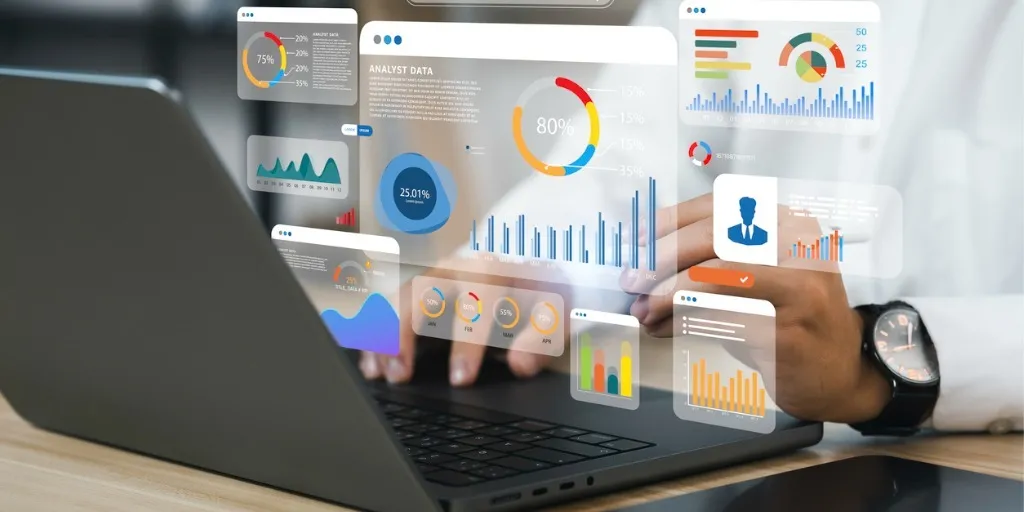From Insights to Growth: Harnessing AI Tools for Marketing Agencies

The rise of artificial intelligence (AI) tools has significantly impacted almost every business, and marketing agencies are no exception. To stay ahead in this evolving landscape, marketing agency owners must embrace the potential of AI and leverage it to maintain their competitive edge.
AI goes beyond automating mundane tasks and repetitive work; it empowers marketing teams to unleash their creativity and generate fresh, innovative ideas. For instance, AI can analyze customer behavior patterns, enabling marketers to derive valuable insights that inform their creative campaigns and strategic approaches.
In my previous article, AI For Team Productivity, Revolutionizing Teamwork in 2023, I took a deep dive into how AI is reshaping the future of work. In this article, we’ll delve into how AI can elevate creativity, communication, collaboration, and campaign effectiveness for marketing agencies.
Before we proceed, let’s address a common concern: AI is not meant to replace humans—at least not yet. It is a tool designed to enhance human capabilities and boost efficiency.
AI, like ChatGPT, is built to process and analyze large amounts of data, generate insights, and provide assistance based on patterns and learned information. It can assist with tasks such as content generation, data analysis, customer support, and more.
However, AI lacks human qualities such as empathy, creativity, and contextual understanding. It is crucial to recognize that AI should be utilized as a tool that works alongside humans, enabling them to focus on higher-level tasks that require critical thinking, emotional intelligence, and complex decision-making.
Now that we’ve addressed that concern, let’s explore the ways AI can inspire creativity and propel marketing agencies to new heights!
Smarter Team Collaboration With AI
Marketing agencies face the challenge of managing multiple teams with diverse skill sets, all while handling complex projects under tight deadlines. This task is far from easy, especially considering the involvement of various stakeholders, including clients, vendors, and external partners who require frequent updates.

Fortunately, AI tools can provide much-needed assistance and simplify the process. These tools include task automation, resource allocation, and real-time progress tracking. Automating repetitive tasks allows teams to focus on more strategic and creative aspects of the projects, ultimately enhancing productivity.
AI tools also facilitate effective communication and collaboration within the agency and with external stakeholders. Features like instant messaging, video conferencing, and file sharing enable seamless communication and swift issue resolution. This ensures that all team members and stakeholders are aligned, minimizing misunderstandings and delays.
Incorporating the expertise of marketing outsource companies can further streamline operations, allowing agencies to focus on strategic initiatives while leveraging external support for specialized tasks.
Streamlining Business Management
Marketing agencies are experiencing significant benefits from AI tools for lead generation across various business segments, ranging from sales and reporting to content and analytics. These AI solutions integrate seamlessly with business management software, enhancing efficiency and decision-making.
Let’s explore the specific areas where AI solutions make a significant business impact:
-
Ad Creation: By harnessing the power of AI, these tools generate ad copy and visuals that are highly relevant, engaging, and tailored to the target audience. This ensures that advertising content captures the attention of users and drives conversions.
-
Audience Targeting: Leveraging customer data, AI analyzes vast amounts of information to identify the most profitable and relevant target audience for advertising campaigns. By precisely targeting the right users at the right time, AI ensures that ads reach the audience most likely to respond positively.
-
Campaign Optimization: AI tools work tirelessly to optimize ad performance. As humans have limitations, AI steps in to continuously monitor and fine-tune various aspects of campaigns, including bidding strategies, ad placements, and targeting parameters. This constant optimization maximizes the return on ad spend (ROAS) and drives optimal results.
-
Performance Analysis: AI provides detailed insights into ad performance, empowering businesses to understand which ads and strategies are most effective. By analyzing vast amounts of data, AI-driven tools offer valuable information that informs future marketing strategies, helping businesses make data-driven decisions for improved results.
The adoption of AI in these business segments enables marketing agencies to streamline processes, improve efficiency, and deliver enhanced results for their clients.
9 Must-Know AI Tools for Marketing Agencies
These are a few of the most popular AI tools made for marketing professionals.
-
SocialBee
SocialBee makes social media management and automation easy and accessible for marketing teams, agencies and entrepreneurs. With features like AI assistant, team collaboration, content creation, scheduling, and analytics, it helps businesses overcome the challenges of limited time and tight budgets.
-
Canva
Canva is an online graphic design tool that uses AI to help users create professional-quality designs quickly and easily. It offers a range of templates, graphics, and other design elements that can be customized to suit any project.
-
Grammarly
Grammarly is an AI writing assistant that helps users improve their writing by checking for grammar and spelling errors, suggesting better word choices, and providing style suggestions. It can be used in a range of settings, from social media posts to longer-form content.
-
Lately.ai
Lately.ai gives you the ability to repurpose your existing blog posts and videos, transforming them into engaging and share-worthy content for your social media platforms. This innovative tool harnesses the insights gained from your audience’s interactions to generate fresh and compelling posts that resonate with your target market.
-
HubSpot
Renderforest AI Video Generator is an online tool that uses artificial intelligence to transform ideas into professional-quality videos quickly and easily. Users can customize every detail, from logos and colors to voiceovers, and select from a variety of pre-designed animation styles to suit any project. No prior experience is needed—simply type your script, and let AI handle the rest, creating engaging, up-to-4K videos in minutes.
-
HubSpot introduced a new generative AI tool, ChatSpot. The new app, currently in alpha, combines technology from HubSpot’s own CRM with OpenAI’s ChatGPT, DALL-E 2, and Google Docs applications like Google Sheets and Google Slides. [They’ve even released some AI content writing tools including an AI email writer, AI blog writer, AI paragraph rewrite, and more.
-
MarketMuse
MarketMuse is an AI content marketing platform that helps businesses optimize their content for search engines and improve their content strategy overall. It uses machine learning to analyze content and identify gaps and opportunities for improvement.
-
Trustmary
Trustmary brings AI to review marketing. This tool analyzes the content and assigns a score between 0 and 100 to determine the most positive and powerful reviews. As a result, you can see in one glance which reviews are worth publishing on your website. You can even let Trustmary automatically prioritize the best reviews in your review widgets.
-
Smartly.io
Smartly.io Is an AI marketing tool that allows you to test out the best-performing ads on social media channels. You can manage all your social media marketing on one single platform.
-
Synthesia
Synthesia stands out as a leading AI-powered video creation platform that revolutionizes the way users generate personalized, high-quality videos effortlessly. By harnessing advanced technologies such as AI-generated avatars, text-to-speech capabilities, and video synthesis, Synthesia empowers individuals and businesses to create realistic and captivating video content without the constraints of cameras, actors, or intricate editing software.
Augmenting Creativity With AI
Marketing agencies can take advantage of AI technology to enhance their creative process. With tools like Midjourney’s AI, agencies can analyze large sets of data to gain insights into customer behavior, preferences, and needs. This helps designers and marketers create campaigns and designs that are tailored to their target audience, resulting in more effective outcomes.
Additionally, Midjourney’s AI image creation technology can help generate fresh ideas for marketing campaigns and design concepts by analyzing existing campaigns and designs, identifying patterns and themes, and generating new ideas based on them. By using AI tools, agencies can streamline their creative process, save time and resources, and produce more impactful campaigns and designs.
Putting AI to Work on Your Content
One of the areas in which AI has made the biggest impact is content, and the results are impressive! With the help of AI, audience targeting has never been easier in digital marketing. And when you use AI insights, you can connect with potential customers more efficiently, attract more visitors, and drive digital transformations.
Take Nestle, for example. They’re using natural language processing (NLP) technology to produce personalized content for different audience segments. By doing so, they’re enhancing their content marketing efforts and boosting sales!
But that’s not all – AI tools are also helping websites connect with visitors through personalized and relevant content. With AI content generation, content marketers can produce more digital content at a faster pace. And if you’re curious to see if AI can work for you, you should try out AI-based content tools like Jasper.ai, Writesonic, and ChatGPT!
Just remember, once you identify the areas where AI can benefit you, make sure to edit the content generated by AI. That way, you can ensure it meets marketing standards and resonates with your audience.
Discovering The Next Big Trend
Another way in which AI is having a huge impact on transforming marketing agencies is through predictive analytics.
Predictive analytics is when companies use historical data combined with statistical modeling, data mining or web scraping techniques, and machine learning to predict what will happen in the future as well as to identify risks and opportunities.
This helps them make better decisions about how much to keep in stock, how to get things to customers faster, and how to sell more. When predictive analytics is combined with artificial intelligence (AI), it gives even better predictions for the future.
For example, AI can help businesses predict which products are likely to be popular in the future based on customer behavior and other data points. This helps businesses save money by being more efficient.
In a recent study conducted by Salesforce, a striking revelation emerged: businesses leveraging the power of predictive analytics were found to be 2.9 times more likely to achieve revenue growth above the industry average. The same Salesforce report highlights that a staggering 73% of customers now anticipate companies to possess a deep understanding of their unique needs and expectations.
This shows the impact that AI can have in helping businesses make informed decisions about their marketing strategies.
Bringing It All Together With Team Communication
While AI is undoubtedly a major advancement in technology and has the potential to revolutionize many industries, it’s important to remember that it’s not a substitute for effective team communication. No matter how advanced the technology, businesses are ultimately run by people, and effective communication between team members is essential for success.
For instance, AI-driven decision-making may be beneficial in some cases, but when it comes to complex problem-solving, there’s no replacement for the collaborative effort of a well-informed team.
In other words; Technology can certainly make communication easier and more efficient, but it’s up to the teams themselves to establish a culture of open communication and collaboration. By prioritizing internal team communication and using AI tools to enhance that communication, businesses can achieve even greater success and have a real impact on their industry.
Spike’s communication and collaboration platform can also benefit agencies by helping them communicate more efficiently and effectively. With features like Priority Inbox, which automatically sorts emails by importance, and Collaborative Notes, which allows teams to plan, brainstorm and work smarter, together.
Moreover, Spike’s real-time translation feature can facilitate communication with clients and partners in different countries, breaking down language barriers and enabling teams to collaborate seamlessly. And with Spike’s team chat feature, teams can discuss projects and share ideas in real-time, further enhancing collaboration.
By using Spike’s collaboration platform, marketing and design agencies can streamline their communication and collaboration processes, save time, and focus on delivering the best outcomes for their clients.




